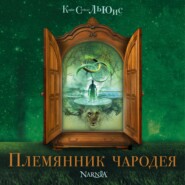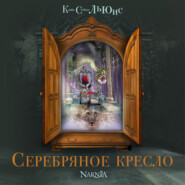По всем вопросам обращайтесь на: info@litportal.ru
(©) 2003-2025.
✖
Collected Letters Volume Three: Narnia, Cambridge and Joy 1950–1963
Настройки чтения
Размер шрифта
Высота строк
Поля
My dear Firor
How the years flick past at our time of life: don’t they: like telegraph posts seen from an express train: and how they crawled once, when the gulf between one Christmas and another was too wide almost for a child’s eye to see across. If ever I write a story about a long-liver, like Haggard’s She or the Wandering Jew
(#ulink_a8f9b9cd-4e2e-583c-9b29-100e59c412e7) (and I might) I shall make that point. The first century of his life will, to the end, seem to him longer than all that have followed it: the Norman Conquest, the discovery of America and the French Revolution are all muddled up in his mind as recent events.
My year ‘off’ has been, as it was meant to be, so far a year of very hard work, but mostly congenial. The book really begins to look as if it might be finished in 1952 and I am, between ourselves, pleased with the manner of it—but afraid of hidden errors. In that way I rather envy you for being engaged in empirical inquiry where, I suppose, mistakes rise up in the laboratory and proclaim themselves. But a mistake in a history of literature walks in silence till the day it turns irrevocable in a printed book and the book goes for review to the only man in England who wd. have known it was a mistake. This, I suppose, is good for one’s soul: and the kind of good I must learn to digest. I am going to be (if I live long enough) one of those men who was a famous writer in his forties and dies unknown—like Christian going down into the green valley of humiliation.
(#ulink_07bb47ad-5893-5a0b-99ae-6fd98eb97daf) Which is the most beautiful thing in Bunyan and can be the most beautiful thing in life if a man takes it quite rightly–a matter I think and pray about a good deal. One thing is certain: much better to begin (at least) learning humility on this side of the grave than to have it all as a fresh problem on the other. Anyway, the desire wh. has to be mortified is such a vulgar and silly one.
Most of us are v. much cheered by having got rid of the Labour government and at finding that we have done so without yet plunging into a period of strikes and sedition and ‘cold’ revolution, which we feared. There are some, not Labour, who feel quite differently. Have you ever heard of Captain Bernard Acworth R. N., a distinguished submarine commander in World War I and v. good Christian of the Evangelical type—but his head absolutely buzzing with Bees? He was with me the other day explaining that the whole American-English-UNO
(#ulink_e61e6c0d-d88c-59af-b4fd-683756829e31) set up is absolutely fatal and part of a plot engineered (so far as I cd. make out) by the Kremlin, the Vatican, and Jews, the Freemasons and–subtlest foe of all—the Darwinians. So I suppose you must be in it too. But there was a core of rationality in it. He thinks our strategy ought to be purely naval, that we can ruin ourselves by trying to keep up an army in Europe and, even so, cannot succeed on those lines.
Have you given up visiting these parts? I (and others) have a very warm memory of your one descent upon Oxford and would greatly welcome another. You are a naturally mobile organism, you know, unlike me. Whether you come or not, all very best wishes and, as always, hearty thanks. I’m sorry for the handwriting: the harder I try, the worse it gets now-a-days.
Yours ever
C. S. Lewis
TO DON GIOVANNI CALABRIA (V):
E Collegio S. Mariae Magdalenae
apud Oxonienses
Die S. Stephani MCMLI[26 December 1951]
Dilectissime Pater
Grato animo epistulam tuam hodie accepi et omnia bona spir-itualia et temporalia tibi in Domino invoco. Mihi in praeterito anno accidit magnum gaudium quod quamquam difficile est verbis exprimere conabor.
Mirum est quod interdum credimus nos credere quae re verâ ex corde non credimus. Diu credebam me credere in remissionem peccatorum. Ac subito (in die S. Marci) haec veritas in mente mea tam manifesto lumine apparuit ut perciperem me numquam antea (etiam post multas confessiones et absolutiones) toto corde hoc credidisse. Tantum distat inter intellectûs mera affirmatio et illa fides medullitus infixa et quasi palpabilis quam apostolus scripsit esse substantiam.
Fortasse haec liberatio concessa est tuis pro me intercessionibus! Confortat me ad dicendum tibi quod vix débet laicus ad sacerdotem, junior ad seniorem, dicere. (Attamen ex ore infantium: immo olim ad Balaam ex ore asini!). Hoc est: multum scribes de tuis peccatis. Cave (liceat mihi, dilectissime pater, dicere cave) ne humilitas in anxietatem aut tristitiam transeat. Mandatum est gaude et semper gaude. Jesus abolevit chirographiam quae contra nos erat. Sursum corda! Indulge mihi, precor, has balbutiones. Semper in meis orationibus et es et eris. Vale.
C. S. Lewis
*
from the College of St Mary Magdalen
Oxford
St Stephen’s Day [26 December] 1951
Dearest Father
Thank you for the letter which I have received from you today and I invoke upon you all spiritual and temporal blessings in the Lord.
As for myself, during the past year a great joy has befallen me. Difficult though it is, I shall try to explain this in words. It is astonishing that sometimes we believe that we believe what, really, in our heart, we do not believe.
For a long time I believed that I believed in the forgiveness of sins. But suddenly (on St Mark’s day)
(#ulink_3b16bbf7-76eb-54be-b0cf-378a6a0f75f3) this truth appeared in my mind in so clear a light that I perceived that never before (and that after many confessions and absolutions) had I believed it with my whole heart.
So great is the difference between mere affirmation by the intellect and that faith, fixed in the very marrow and as it were palpable, which the Apostle wrote was substance.
(#ulink_0ed604fc-cc40-5f4b-ac66-bc8d6a428156)
Perhaps I was granted this deliverance in response to your intercessions on my behalf!
This emboldens me to say to you something that a layman ought scarcely to say to a priest nor a junior to a senior. (On the other hand, out of the mouths of babes:
(#ulink_c9c90b19-02b0-5d5a-a8ef-24a466cb78ae) indeed, as once to Balaam, out of the mouth of an ass!)
(#ulink_968bc2b5-1816-567e-8b4e-1c19a771b449) It is this: you write much about your own sins. Beware (permit me, my dearest Father, to say beware) lest humility should pass over into anxiety or sadness. It is bidden us to ‘rejoice and always rejoice’.
(#ulink_79e2a171-32d9-5f62-87c0-47ed3ad5f6bd) lesus has cancelled the handwriting which was against us.
(#ulink_d08f7843-ded0-5c51-9c2c-b46ccc18d9f4) Lift up our hearts!
Permit me, I pray you, these stammerings. You are ever in my prayers and ever will be.
Farewell.
C. S. Lewis
1 (#ulink_dad5e8c7-3534-5c75-8bf8-a966e0104b5c) 1 Timothy 2:1: ‘I exhort therefore, that, first of all, supplications, prayers, intercessions, and giving of thanks, be made for all men.’
2 (#ulink_92ce2597-a9ac-5f4e-898e-545d817b53e0) Many of these thoughts were later to go into Lewis’s essay, ‘The Efficacy of Prayer’, published in Fern-seed and Elephants and Other Essays on Christianity, ed. Walter Hooper (London: Collins, 1975; Fount, 1998).
3 (#ulink_48b3909d-3de6-51e4-b844-d8cbaf4f15b8) Vanauken had asked Lewis his opinion as to whether he should continue with his postgraduate work in history or study theology.
4 (#ulink_e4b3b9f5-bf37-55a7-a17e-b3eb46f3d19a) Francis Bacon, Essays (1625), ‘Of Atheism’: ‘The great atheists, indeed are hypocrites; which are ever handling holy things, but without feeling; so as they must needs be cauterized in the end.’
5 (#ulink_09970bce-d372-5262-9830-4b37e95bde91) Pauline Baynes was illustrating the Narnian books.
6 (#ulink_24a69295-6482-5bda-be7a-86bb2565c9a7) At a meeting with Geoffrey Bles in London on 1 January 1951 Lewis gave Pauline Baynes a map he had drawn of Narnia bordered on the north by the ‘Wild Lands of the North’ as well as his drawing of a Monopod. In this letter he refers to that map which is in the Bodleian Library. (MS. Eng. lett. c. 220/1, fol. 160), and is reproduced by the Bodleian as a postcard. Baynes used Lewis’s original map to draw (1) ‘A Map of Narnian and Adjoining Lands’ which appeared on the endpapers of Prince Caspian; (2) a map of the Bight of Calormen and the Lone Islands of the Great Eastern Ocean which appeared on the endpapers of The Voyage of the ‘Dawn Treader’ (1952); (3) ‘A Map of the Wild Lands of the North’ which appeared on the endpapers of The Silver Chair (1953); and (4) a map on the endpapers of The Horse and His Boy (1954) showing the position of Tashbaan, the Desert and Archenland.
7 (#ulink_a9779837-88c0-571f-a430-64f79ce0e29d) George MacDonald, Unspoken Sermons, 2nd series (1885), ‘The Fear of God’, p. 163.
8 (#ulink_33470893-0ee8-5378-a1e1-b69699e25771) See Percy Howard Newby, writer and broadcasting administrator, in the Biographical Appendix.
9 (#ulink_0fa84a80-eaf5-5b4c-b31f-8fb63fc74ccc) Newby, Organizer of Third Programme Talks for the BBC, had written to Lewis on 9 February 1951: ‘From time to time we broadcast in the Third Programme talks under the general title of “Work in Progress”, the general idea being that scholars and critics should discuss the nature and scope of a particular book they are engaged upon. We should be very happy if you would talk in this way about the volume you are preparing for the Oxford History of English Literature.’
10 (#ulink_d8f3c76e-0919-5d70-af04-beffb5444178) William Lewis Kinter (1915–) was born in St Thomas, Pennsylvania, on 21 October 1915. He took a BA in English from Lafayette College, Easton, Pennsylvania, in 1938, another BA from Yale University in 1940, and a PhD from Columbia University, New York, in 1958. He taught Latin and English at Westminster School, Hartford, Connecticut, 1944-6, was Assistant Professor of English at Muhlenberg College, Allentown, Pennsylvania, 1946-62, and Associate Professor of English at Loyola College, Baltimore, Maryland, 1962-78. From there he became Chairman of the Department of Language and Literature at the Maryland Institute College of Art in Baltimore. He is the author, with loseph R. Keller, of The Sibyl: Prophetess of Antiquity and Medieval Fay (Philadelphia: Dorrance, 1967).
11 (#ulink_b34940ea-7f29-5103-97ca-b7182543f23e)Spirits in Bondage: A Cycle of Lyrics (1919), Lewis’s first book, was published under the pseudonym ‘Clive Hamilton’. See CL I, p. 443n.

















